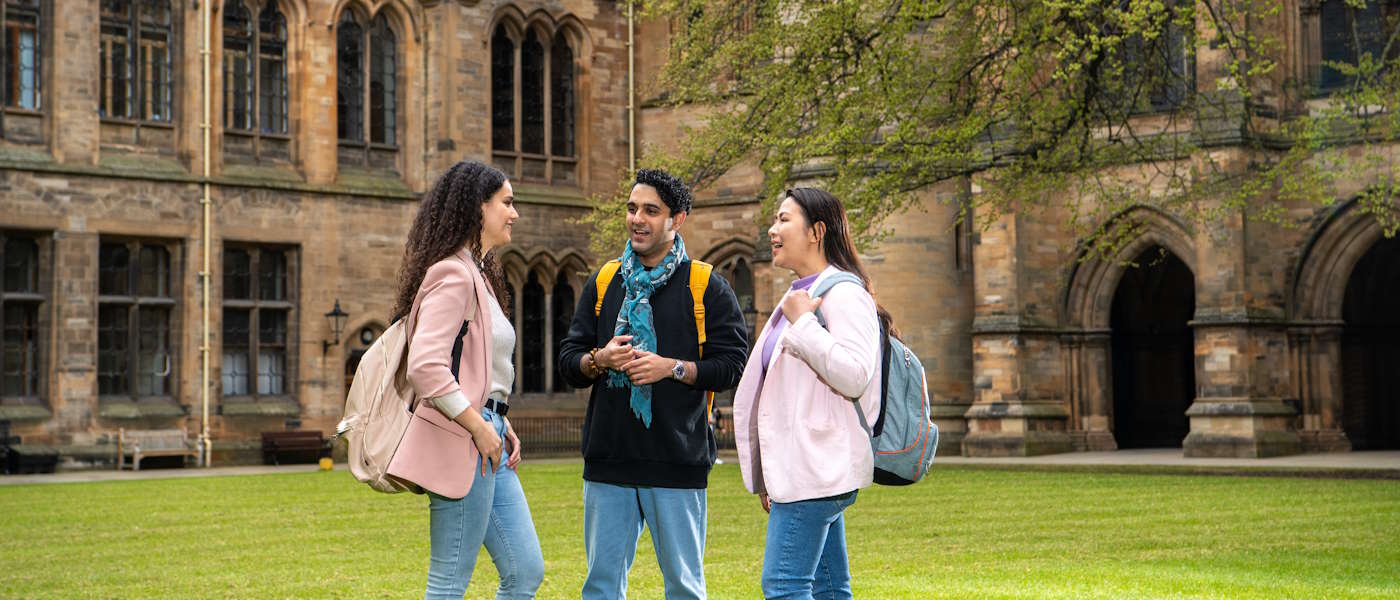About the School of Humanities
The School has six Subject Areas, a dedicated Professional Services team, and over 140 academic and professional staff. We teach around 1500 undergraduate students, over 250 taught postgrads, over 100 postgrad researchers, and are in addition home to a number of postdoctoral researchers, visiting staff, and students from all over the world. Some information about each of our subject areas can be found below, but you can also find out about our research, teaching, and public engagement and impact work by contacting Heads of Subject and others in the School directly. Contact details can be found here.
Please do not hesitate to contact the Head of School, Professor Ian Forrest, if you have any questions.
Archaeology
Archaeology has been taught at the University of Glasgow for over 60 years. We have a shared ethos of engaged archaeology with our research and teaching embracing the social impact and benefits of archaeology as well as the more traditional aspects of the discipline. Our research strengths are focused on three clusters - landscape, material culture, and digital archaeology - while we are an emergent centre in archaeological science. We have several successful Masters programmes, including our Archaeology MSc with strands including landscape, digital and Celtic archaeology, and our popular MSc in Material Culture and Artefact Studies. Our students are encouraged to gain as much heritage work experience as possible at all levels, and we have partnerships with various organisations across Scotland to facilitate placements and field opportunities, as well as our own summer fieldschool. Our staff and research students carry out fieldwork and research in Scotland, NW Europe, and the Mediterranean / Southwest Asia.
Ceiltis is Gàidhlig/Celtic & Gaelic
Tha Ceiltis is Gàidhlig a’ tabhann farsaingeachd de chùrsaichean air cànan, litreachas, eachdraidh agus cultar nan sluaghan Ceilteach bhon àm as tràithe air a bheil fianais chun an latha an-diugh. Tha cùrsaichean aig gach ìre ann an Gàidhlig na h-Alba agus aig ìre Urramach agus Iar-Cheumnach ann an Seann Ghàidhlig, Cuimris Meadhan-Aoiseil agus Gàidhlig na h-Èireann do luchd-tòiseachaidh. Tha an teagasg aig ìre Urramach agus Iarr-Cheumnach a’ cumail gu dlùth ri ùidhean rannsachaidh agus eòlas an luchd-obrach. Am measg nan raointean eòlais tha eòlas air ainmean-àite, litreachas Ceilteach meadhan-aoiseil no litreachas agus cultar Gàidhlig na h-Alba. Cho math ri sin uile tha Ceiltis is Gàidhlig cuideachd a’ tabhann cùrsa Bliadhna Bhogaidh far am bithear ag ionnsachadh na Gàidhlig tro mhodhan teagaisg bogaidh agus anns a bheil cùrsa-còmhnaidh 3 seachdainean ann an coimhearsnachd Ghàidhealach Uibhist a Deas. Air taobh nan cùrsaichean Gàidhlig, tha cuideam ga chur air teagasg agus measadh tro mheadhan na Gàidhlig.
Celtic & Gaelic offers a broad range of courses on the languages, literature, history, culture of the Celtic peoples from the earliest evidence through to the present day. Courses are available at all levels in Scottish Gaelic and at Hons and PG Level in Early Gaelic (Old Irish), Medieval Welsh, and Introductory Modern Irish. Teaching at Hons and PG level is closely aligned to staff’s research interests and allows students to study with active researchers who are experts in their areas, whether that be Celtic onomastics, medieval Celtic literature or modern Gaelic literature and culture. A further key feature of Celtic & Gaelic's provision is the innovative Gaelic Immersion course which offers a Gaelic immersion experience on campus and which includes a 3-week residential in the Gaelic speaking community of South Uist. Across our Gaelic offerings at all levels, emphasis is also placed on delivering and assessing courses through the medium of Gaelic or bilingually.
Classics
Greek, Latin and the study of classical antiquity have been taught at Glasgow since the university's foundation. Today, the subject area of Classics has particular research strengths in drama (Greek and Roman); politics (including oratory); science, technology and medicine; historiography; and religion. It also looks at the reception of classical Greece and Rome across many contexts, from Byzantium to video games.
History
Since the founding of a Chair in History in 1897, History at Glasgow has featured wide chronological range, from early medieval to late modern. Today History offers special expertise in US History, Scottish History, Gender History, War Studies and Conflict Archaeology, Global History, and Slavery Studies, with leading practitioners in oral history and charter studies.
Information Studies
Information Studies provides a pioneering undergraduate degree in Digital Media and Information Studies as well as Masters degrees in Information Management and Preservation and Museum Studies and are unique in having accreditation for all our degrees by CILIP and/or ARA. We have particular strengths in Digital Heritage, Digital Humanities, Information Analysis and Information Management. Our research has international impact and engagement and we support a vibrant community of post-graduate research students. We are a member of the international iSchools group, host the Digital Preservation Coalition and have extensive partnerships with cultural heritage organisations at home and abroad.
Philosophy
Philosophy has an illustrious history at Glasgow, where it has been taught since 1451, by such luminaries as Frances Hutcheson, Thomas Reid, and Adam Smith. These days, our friendly and vibrant community includes about 20 permanent staff as well as postdocs, visiting researchers, and of course our numerous students. Our student programmes cover all levels, including extremely popular pre-honours courses, two large honours years, three separate MScs (including one for students with no philosophical background, and another co-taught with Psychology), and a successful doctoral programme. We host two thriving research centres, the CSPE for perception and philosophy of mind, and Cogito for epistemology, but our research and teaching also cover the full breadth of the discipline.


